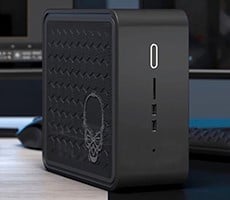Test System Configuration Notes: When configuring our test systems for this article, we first made sure all firmware was up to date, then we entered their respective system BIOSes /
UEFI and set each board to its "Optimized" or "High performance" defaults. We then saved the settings, re-entered the BIOS and set the memory frequency to the maximum officially supported speed for the given platform (without overclocking). The
SSDs were then formatted, and the latest build of Windows 10 Pro x64 was installed.
When the
Windows 10 installation was complete, we fully updated the OS, and installed all of the drivers necessary for our components. Auto-Updating and Windows Defender were then disabled, and we installed all of our benchmarking software, performed a disk clean-up, and cleared any temp and prefetch data. Finally, we enabled Windows Quiet Hours / Focus Assist and let the systems reach an idle state before invoking a test.
 |
| HotHardware's Test Systems |
| Intel and AMD - Head To Head |
|
 |
| Preliminary Testing with SiSoft SANDRA 2018 |
| Synthetic Benchmarks |
|
We began our testing with the latest version of SiSoftware's SANDRA, the System ANalyzer, Diagnostic and Reporting Assistant. We ran four of the built-in sub-system tests that partially comprise the suite with Intel's latest processors (CPU Arithmetic, Multimedia, Cache and Memory, and Memory Bandwidth). All of the scores reported below were taken with the Intel NUC NUC8i7BEH running at default settings, with 16GB of DDR4 RAM running at 2400MHz, in dual-channel mode.
|

Processor Arithmetic
|

Multi-Media
|
|

Memory Bandwidth
|

Cache and Memory
|
The Intel NUC8i7BEH put up some strong numbers according to SANDRA. The CPU performed slightly better than a Core i7-7700K in the processor arithmetic and multi-media benchmarks and memory bandwidth was north of 24GB/s. The cache and latency benchmark also looks particularly strong. Keep in mind, the 128MB of eDRAM associated with the Iris Plus 655 graphics is essentially an L4 cache that can feed the L3, which can enhance performance in some workloads.
 |
| PCMark 10 |
| System Level Benchmark |
|
PCMark 10 is one of Futuremark’s series of popular PC benchmarking tools. It is designed to test the performance of all types of systems, from tablets to desktops. It offers multiple separate benchmark tests to help consumers find devices that offers the perfect combination of efficiency and performance for their particular use case.
This version of the suite improves the Essentials, Productivity, and Digital Content Creation benchmarks with tests using popular open source applications for image processing, video editing, spreadsheets, and the like...
We don't have a ton of PCMark 10 data from small form factor systems, so we compared the NUC8i7BEH to
Hades Canyon and a handful of notebooks and desktops to provide a good mix of reference points. As you can see, the NUC8i7BEH performed very well. It ranked near the top overall, behind only the more powerful desktop systems, and it actually posted the best Essentials score of the bunch.













